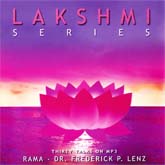
Lakshmi Series
How To Achieve Spiritual Balance
How to achieve spiritual balance. The way to achieve spiritual balance is without trying.
Spiritual balance is something that all of us innately are. There are many different types of balance. Normally when we think of balance, we have a preconceived notion of what balance is. That notion comes to some extent from our experience as physical beings in a physical world. For example, when we think of balance we think of a basic ratio and proportion, an equation that permits life to exist, as in an ecosystem where balance is achieved through a symbiotic process in which one organism aids another organism in its survival.
Ultimately everything is always in a state of balance, though sometimes we prefer one form of balance to another. For example, you may feel that emotional balance is a state that you call happiness. Happiness is achieved for you in a specific way. Happiness may mean making enough money. Happiness may mean having people love you; feeling physically fit; sensing that the work you do is of value, not only to yourself but to others; sexual fulfillment; prestige; infinite awareness or infinite consciousness; spiritual evolution - a sense that you are making progress, that you're not just walking through the doorway of life again and again without anything occurring, but there is a sense of movement or growth. Some of these are qualities that might fit into your equation of spiritual balance, emotional balance and personal balance.
However, from my point of view, spiritual balance is not so easy to achieve - in an ultimate sense. There's relative spiritual balance, the spiritual balance that you can achieve just by having a harmonious life, but life itself is transitory, it doesn't really last. Each one of us is a reflection of an eternal process, which is really something that cannot be fathomed or understood with the mind, although we can penetrate its mysteries and enter into and become one with its essence. Spiritual balance is a process that occurs over many, many lifetimes or incarnations. We could say that the process of reincarnation is a process of balance. In each lifetime there are certain formations within the cells that need to be worked on.
Imagine that we have a piece of wood, and the piece of wood has a shape and a beauty all of its own. Perhaps it's a limb from a tree and has a lot of nuances, formations, bark - different parts of it, each part having a special beauty. But suppose what we want to do is transform it, change it, reshape it. Let's just say that that's its destiny. Why? Who knows? None of us know why destiny is. We only know that we are destiny.
So, the piece of wood begins to transform in our hands. We take a bit of sandpaper and we decide to work on the roughest corner first, the most jagged edge, and we begin to sand it down. Then after a while we put the piece of wood down, and we're tired and we go off and do something else. We come back and pick it up another day and work, perhaps, on a different edge. Gradually, day after day, we sand away until finally the bark is completely removed, all the rough edges are smooth.
Had we taken a photograph at the beginning of this process, and now at this stage of the process, we would see two really dissimilar forms. The form that is in our hands now really doesn't resemble the initial tree. It's smooth and shaped somewhat differently and the bark is all gone - the spiritual transformation process. Now suppose we decide to take that piece of wood and we continue to sand it. Each day we sand further and further until one day there's nothing left. Spiritual balance.

